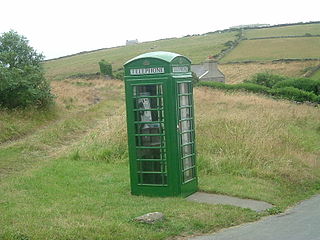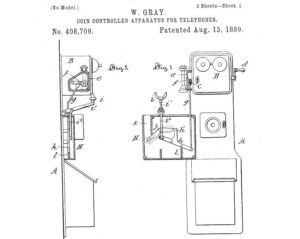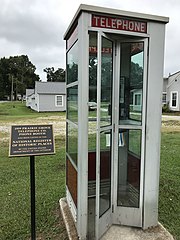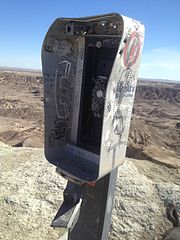
Phone booths are so 20th century, but when coin-operated telephones appeared in 1889, they represented a technological breakthrough as amazing as a modern smart phone.
At the time, telephones weren’t uncommon, but there were no public venues. It was possible to find an agent operating a telephone pay station. For a fee, the customer could make a call, but this wasn’t a convenient arrangement.
There are three ideas about why William Gray invented the coin-operated telephone. It may be from a suggestion he received from either his boss, or a neighbor. But I think the most logical explanation is personal necessity.
When his wife became ill, Gray asked workers at a nearby factory to let him use their phone to call a doctor. They refused, and Gray recognized an invention that needed to be made.*

On August 13, 1889, Gray received Patent No. 408,709 for coin-operated apparatus for telephones. The apparatus had a small bell to alert the operator when a coin had been deposited and the call could go through. The first public phone was installed on the corner of Main Street and Central Row in downtown Hartford, Connecticut. In 1891 Gray established the Gray Telephone Pay Station Company.

In the interest of privacy, phone booths appeared in the early 1900s. They’ve become utiqutious symbols in their own right. In the 1960s spy spoof Get Smart, secret agent Maxwell Smart had a telephone in his shoe, but his office was a phone booth. In Alfred Hitchcock’s The Birds, Tippi Hedrun seeks refuge in a telephone booth.

Even more iconic, Clark Kent ducked into a telephone booth and emerged as Superman. Or did he? The answer is yes and no. It’s true that in a 1942 comic strip, Clark was out with Lois Lane when he saw a job for Superman. He said he needed to make a phone call, slipped into the phone booth and presto-chango.
A phone booth is not the easiest place to change clothes as this spoof demonstrates.
But Clark could change anywhere — a closet, a stairwell, jumping out a window, or while flying.
In 1991, there were about two million pay telephones in the United States. Today the figure is 5 percent of that. The major telephone companies have exited the service, since usage doesn’t pay for costs. But smaller companies continue the service. In 2015, Pacific Telemanagement Services reported $286 million in revenue.

The fact is, mobile phones aren’t enough. They don’t work in remote areas or when cell towers are down in storms. Ten percent of Americans don’t have cell phones, despite government subsidies for those who can’t afford them. Pay phones are common in heavily immigrant areas where it can be less expensive to call long distance on a pay phone. Pay phones are also found in areas with low paid workers or migrant farmers, and outside prisons and schools.
New York City is replacing pay telephones with kiosks that offer phone calls, free WiFi, Internet service, and a port to charge cell phones. Superman, however, will need a new dressing room.
*Gray did manage to summon a doctor, and his wife made a full recovery.
☎️☎️☎️
Phone Box on the Isle of Man. Public Domain.
Phone Booth by Camny Nelson
Superman, 1942. Public Domain.
Phone Booth by redrockerfan
“Where do we get the idea that Superman changes in Phone Booths?” Stack Exchange.
Tanvi Misra. “Why Some Places Still have Plenty of Pay Phones.” Citylab. Nov. 10, 2014
Jimmy Stamp. “The Pay Phone’s Journey from Patent to Urban Relic”. Smithsonian. Sept. 18, 2014.

Sandra Wagner-Wright holds the doctoral degree in history and taught women’s and global history at the University of Hawai`i. Sandra travels for her research, most recently to Salem, Massachusetts, the setting of her new Salem Stories series. She also enjoys traveling for new experiences. Recent trips include Antarctica and a river cruise on the Rhine from Amsterdam to Basel.
Sandra particularly likes writing about strong women who make a difference. She lives in Hilo, Hawai`i with her family and writes a blog relating to history, travel, and the idiosyncrasies of life.

